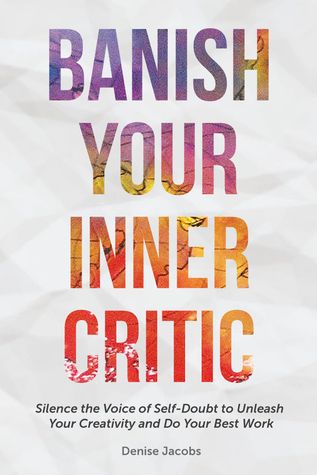Banish Your Inner Critic – Denise Jacobs

Creativity comes from relaxing self-evaluation and self-judgment—and the self-criticism and self-doubt that result from them.
Feeling like an imposter can impact one’s ability to be creative or try new things.
Imposter Syndrome And Creative People
Imposter syndrome is that inner voice telling you that your work is not good enough or, even worse, that you’re useless as a person.
Self-criticism can really bring us down (and keep us down).
Suffering from “imposter syndrome” is common among most of us.
Even those who least expect it often suffer from some form of self-criticism.
From Stagnation To Action
Letting go of our preoccupation with the trajectory of other people’s lives, we can transform our envy from a stagnant, blocking force into a powerful motivator for growth.
The tools and ideas above help us reframe our self-criticism; seeing critical thoughts for what they are and combating them with compassionate thoughts.
Replace Self-Criticism With Self-Compassion
Instead of applying self-criticism, we need to actively practice the opposite: self-compassion.
Self-compassion is realizing that self-criticism is the enemy and then acting to reverse its negative effects. Self-compassion also helps to unlock creativity.
The two components of self-compassion are:
- Making a conscious effort to stop self-judgment.
- Actively comforting ourselves, just as we would do with a friend in need.
Awfulizing
Something happens, and we imagine the absolute worst. Our minds play tricks on us, and we start “awfulizing.”
To stop this:
First, on a piece of paper or in a journal, write down and answer the question, “What am I afraid will happen?”
Next, write down a response to this question: “What could happen?”
If we actively apply realistic optimism, looking at the facts of the situation at hand without embellishing or minimizing them, we can avoid a “spiraling” effect.
Recognizing The Inner Critical Voice
Awareness of your inner critical voice is crucial. This then enables you to see your critical thoughts for what they are: thoughts.
Being more aware of what your brain and mind do when they sense a potential threat in the form of being judged or receiving criticism will encourage the development of a calmer part of the mind.
Living With Criticism
There are a number of valuable tips to help you learn to take criticism well and use it to get better at whatever you are doing:
- Breathe.
- Detach from the situation or event mentally.
- Listen actively.
- Get specific demands and relevant, constructive criticism.
- Discover new perspectives.
- Be curious.
- Grow.
- Learn in real time.
Be so busy improving yourself that you have no time to criticize others.
Cognitive Distortions
There are a number of so-called cognitive distortions that are relevant to the Inner Critic:
- Mental filters, or selective abstraction.
- Tunnel vision.
- Magnification and Minimisation or binocular trick.
- Overgeneralizations
- Jumping to conclusions
- Mind reading or hunches.
- Pessimism and catastrophizing a given situation by imagining the worst.
- Emotional reasoning.
- Thinking in All or Nothing terms(Black or White)
- Ignoring the positive aspects of a situation
- Thinking everything is our own fault
- Mislabeling of characterizations
Seeking Positive Confirmation
The good thing about negative confirmation bias is that it can be flipped to create a positive, self-fulfilling prophecy too.
Rather than walking around in a perpetual state of feeling that no one believes in you, you can be on the hunt for support. Use confirmation as a positive force to seek out positivity rather than negativity.

